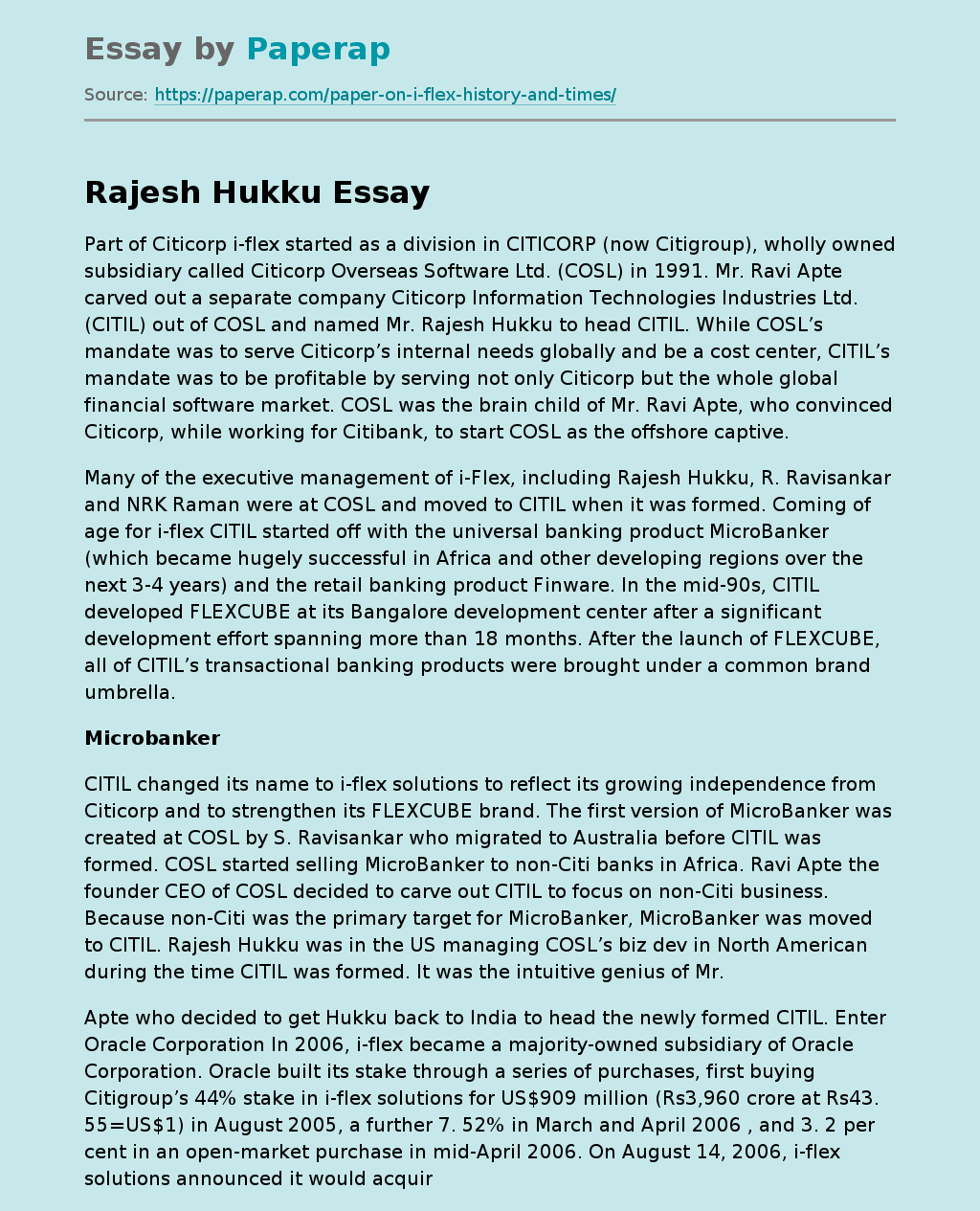Citicorp i-flex Origins
Part of Citicorp i-flex started as a division in CITICORP (now Citigroup), wholly owned subsidiary called Citicorp Overseas Software Ltd. (COSL) in 1991. Mr. Ravi Apte carved out a separate company Citicorp Information Technologies Industries Ltd. (CITIL) out of COSL and named Mr. Rajesh Hukku to head CITIL. While COSL’s mandate was to serve Citicorp’s internal needs globally and be a cost center, CITIL’s mandate was to be profitable by serving not only Citicorp but the whole global financial software market.
COSL was the brain child of Mr. Ravi Apte, who convinced Citicorp, while working for Citibank, to start COSL as the offshore captive.
Many of the executive management of i-Flex, including Rajesh Hukku, R. Ravisankar and NRK Raman were at COSL and moved to CITIL when it was formed. Coming of age for i-flex CITIL started off with the universal banking product MicroBanker (which became hugely successful in Africa and other developing regions over the next 3-4 years) and the retail banking product Finware.
In the mid-90s, CITIL developed FLEXCUBE at its Bangalore development center after a significant development effort spanning more than 18 months. After the launch of FLEXCUBE, all of CITIL’s transactional banking products were brought under a common brand umbrella.
Microbanker
CITIL changed its name to i-flex solutions to reflect its growing independence from Citicorp and to strengthen its FLEXCUBE brand. The first version of MicroBanker was created at COSL by S. Ravisankar who migrated to Australia before CITIL was formed. COSL started selling MicroBanker to non-Citi banks in Africa.
Ravi Apte the founder CEO of COSL decided to carve out CITIL to focus on non-Citi business. Because non-Citi was the primary target for MicroBanker, MicroBanker was moved to CITIL. Rajesh Hukku was in the US managing COSL’s biz dev in North American during the time CITIL was formed. It was the intuitive genius of Mr.
Apte who decided to get Hukku back to India to head the newly formed CITIL. Enter Oracle Corporation In 2006, i-flex became a majority-owned subsidiary of Oracle Corporation. Oracle built its stake through a series of purchases, first buying Citigroup’s 44% stake in i-flex solutions for US$909 million (Rs3,960 crore at Rs43. 55=US$1) in August 2005, a further 7. 52% in March and April 2006 , and 3. 2 per cent in an open-market purchase in mid-April 2006. On August 14, 2006, i-flex solutions announced it would acquire Mantas, a US-based anti-money laundering and compliance software company for US$122. million. The company part-funded the transaction through a preferential share allotment to majority shareholder Oracle Corporation. Following its acquisition by Oracle, i-flex has begun an expansion plan reportedly to capitalize on its owner’s brand and financial strength. [citation needed] It has invested to expand capacity at its existing locations in India which is reportedly sufficient to accommodate 17,000 employees compared with over 10000 staff already employed by the company in August 2007.
On January 12, 2007, after an open offer price to minority shareholders last month, Oracle now has close to around 83% stake in i-flex. [1] On April 4, 2008, the board of directors of i-flex solutions approved a proposal to change the name of the company to Oracle Financial Services Limited, subject to regulatory and shareholder approvals. A press release issued by the company said that “The proposed new name reflects the company’s close strategic and operational alignment with its parent, Oracle Corporation, which owns 81 percent of the company. It added that the current management team under N. R. K. Raman, CEO and Managing Director, will continue to run the operations of the company. i-flex is deploying fundtech’s Global payplus at Barclays Bank plc UK, to process payments for SEPA and newly introduced FASTER PAYMENTS SYSTEM scheme in UK. Barclays became first bank in UK to implement FPS and this is major step for Barclays to completely revamp its aging legacy system for payments processing and core banking applications.
Citicorp i-flex Origins. (2019, Dec 05). Retrieved from https://paperap.com/paper-on-i-flex-history-and-times/

